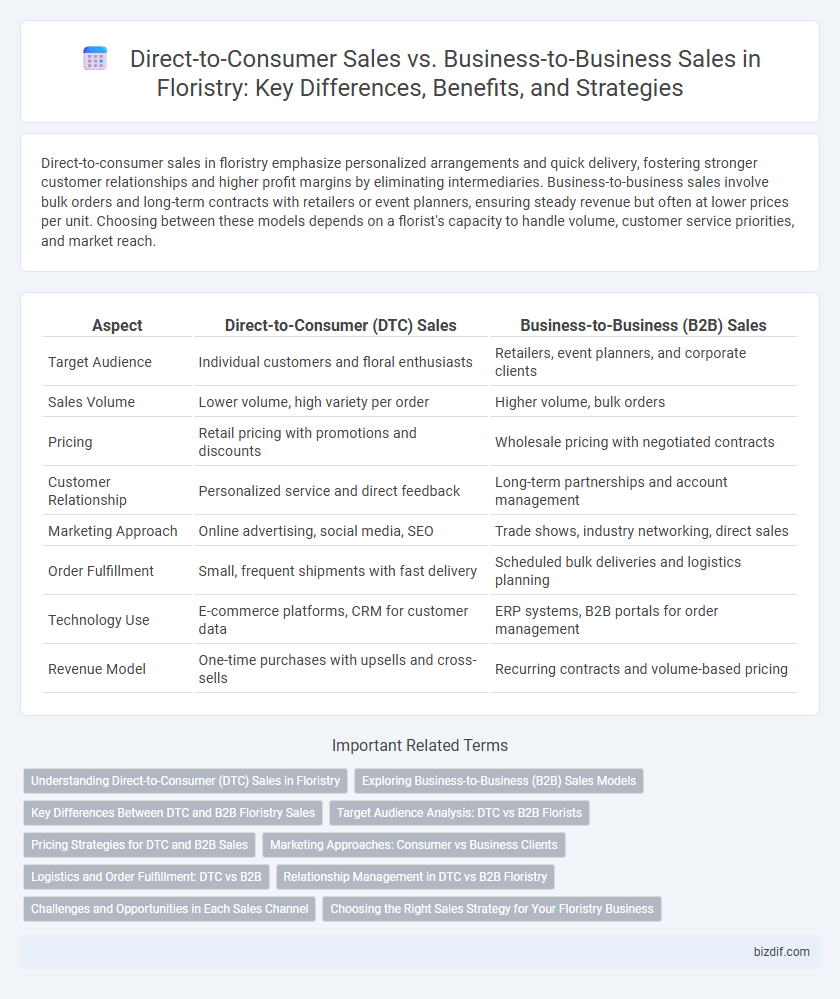Direct-to-consumer sales in floristry emphasize personalized arrangements and quick delivery, fostering stronger customer relationships and higher profit margins by eliminating intermediaries. Business-to-business sales involve bulk orders and long-term contracts with retailers or event planners, ensuring steady revenue but often at lower prices per unit. Choosing between these models depends on a florist's capacity to handle volume, customer service priorities, and market reach.
Table of Comparison
| Aspect | Direct-to-Consumer (DTC) Sales | Business-to-Business (B2B) Sales |
|---|---|---|
| Target Audience | Individual customers and floral enthusiasts | Retailers, event planners, and corporate clients |
| Sales Volume | Lower volume, high variety per order | Higher volume, bulk orders |
| Pricing | Retail pricing with promotions and discounts | Wholesale pricing with negotiated contracts |
| Customer Relationship | Personalized service and direct feedback | Long-term partnerships and account management |
| Marketing Approach | Online advertising, social media, SEO | Trade shows, industry networking, direct sales |
| Order Fulfillment | Small, frequent shipments with fast delivery | Scheduled bulk deliveries and logistics planning |
| Technology Use | E-commerce platforms, CRM for customer data | ERP systems, B2B portals for order management |
| Revenue Model | One-time purchases with upsells and cross-sells | Recurring contracts and volume-based pricing |
Understanding Direct-to-Consumer (DTC) Sales in Floristry
Direct-to-consumer (DTC) sales in floristry enable florists to sell fresh flowers and arrangements directly to customers through online platforms or physical storefronts, ensuring personalized service and immediate feedback. This model reduces dependency on intermediaries, allowing florists to control pricing, branding, and customer experience while increasing profit margins. Emphasizing local sourcing and bespoke floral designs enhances customer satisfaction and loyalty within the competitive flower market.
Exploring Business-to-Business (B2B) Sales Models
Business-to-Business (B2B) sales models in floristry prioritize bulk orders and long-term contracts with event planners, retail shops, and corporate clients, ensuring consistent demand and stable revenue streams. These models often involve customized floral arrangements, wholesale pricing, and supply chain integration to meet specific client needs efficiently. Leveraging B2B partnerships accelerates market expansion and enables florists to scale operations with reduced marketing costs compared to Direct-to-Consumer (D2C) sales.
Key Differences Between DTC and B2B Floristry Sales
Direct-to-consumer (DTC) floristry sales focus on personalized arrangements and immediate delivery to individual customers, emphasizing emotional appeal and seasonal trends. Business-to-business (B2B) floristry sales involve bulk orders, long-term contracts, and standardized products tailored for events, retailers, or hospitality industries. Pricing strategies differ, with DTC prioritizing retail margins and B2B relying on volume discounts and established partnerships.
Target Audience Analysis: DTC vs B2B Florists
Direct-to-consumer (DTC) florists primarily target individual buyers seeking personalized floral arrangements for occasions such as weddings, anniversaries, and holidays, focusing on emotional engagement and convenience through online platforms. Business-to-business (B2B) florists cater to corporate clients, event planners, and retail stores, emphasizing volume discounts, consistent supply, and customized solutions for professional use. Understanding the distinct purchasing motivations and decision-making processes of DTC customers versus B2B buyers is crucial for florists to tailor marketing strategies and optimize sales channels effectively.
Pricing Strategies for DTC and B2B Sales
Direct-to-consumer (DTC) floristry pricing strategies emphasize competitive retail pricing combined with personalization and convenience to maximize customer value and encourage repeat purchases. Business-to-business (B2B) sales focus on volume discounts, contract pricing, and flexible payment terms to accommodate bulk orders and long-term partnerships with event planners, retailers, and corporate clients. Understanding cost margins, seasonal demand fluctuations, and customer purchasing behaviors is essential for optimizing profitability in both DTC and B2B flower sales channels.
Marketing Approaches: Consumer vs Business Clients
Direct-to-consumer floristry marketing emphasizes personalized experiences, leveraging social media campaigns, influencer partnerships, and targeted ads to engage individual customers seeking unique floral arrangements for personal occasions. Business-to-business strategies prioritize relationship building through trade shows, corporate discounts, and bulk order incentives, focusing on reliability, branding, and long-term contracts with event planners, hotels, and retailers. Understanding the purchasing motivations, florists tailor messages to highlight emotional appeal for consumers and efficiency or cost-effectiveness for business clients, optimizing conversion in each market segment.
Logistics and Order Fulfillment: DTC vs B2B
Direct-to-consumer (DTC) sales in floristry require agile logistics that prioritize speed and freshness, often involving same-day delivery and temperature-controlled packaging to maintain floral quality. Business-to-business (B2B) sales emphasize bulk order fulfillment with scheduled deliveries and reliable supply chain coordination to cater to retail stores, event planners, and corporate clients. Optimizing inventory management and route planning is crucial in both DTC and B2B channels to minimize flower spoilage and enhance customer satisfaction.
Relationship Management in DTC vs B2B Floristry
Direct-to-consumer (DTC) floristry sales emphasize personalized customer experiences and emotional engagement through tailored floral designs and direct communication channels, fostering brand loyalty and repeat purchases. In contrast, business-to-business (B2B) floristry prioritizes strategic relationship management, focusing on volume contracts, consistent supply chains, and long-term partnerships with event planners, retailers, or corporate clients. Effective CRM systems in DTC enable customized marketing and customer feedback loops, while B2B relies on account management and negotiated service agreements to maintain trust and operational efficiency.
Challenges and Opportunities in Each Sales Channel
Direct-to-consumer sales in floristry offer personalized customer experiences and higher profit margins but face challenges such as intense competition, seasonal demand fluctuations, and logistics complexities for perishable products. Business-to-business sales provide steady, bulk orders and long-term partnerships with event planners and retailers, yet require consistent quality, competitive pricing, and efficient supply chain management to maintain client loyalty. Leveraging digital marketing and data analytics can optimize inventory control and customer targeting in both channels, enhancing profitability and operational efficiency.
Choosing the Right Sales Strategy for Your Floristry Business
Direct-to-consumer sales offer floristry businesses greater control over brand experience and higher profit margins by eliminating intermediaries, ideal for personalized bouquets and local delivery. Business-to-business sales provide steady bulk orders and long-term partnerships with event planners, retailers, and corporate clients, ensuring consistent revenue streams. Assessing target markets, operational capacity, and marketing resources helps determine the optimal balance between these strategies to maximize growth and customer reach.
Direct-to-consumer sales vs Business-to-business sales Infographic

 bizdif.com
bizdif.com